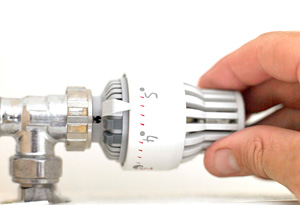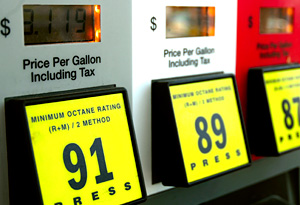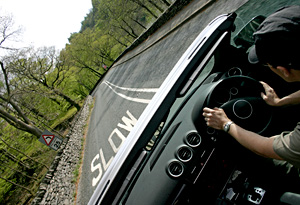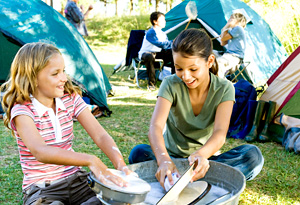10 Ways to Save Money—and the Planet—on Your Summer Vacation

Before you pack your bags for your well-earned summer break, follow these simple money-saving travel tips from Shift Your Habit author Elizabeth Rogers.
With summer now in full swing, many of us are looking for ways to take that memorable summer vacation without breaking the bank. From airfare to hotel stays to baggage fees, vacation costs can quickly add up if we aren't careful. However, making efficient travel choices does not have to translate into less fun in the sun. By unplugging our appliances while we're away on vacation, packing lighter, driving slower and making other simple shifts, we can each save hundreds—even thousands—of dollars and afford to relax, spend a little time with our family and explore the great outdoors.Bon voyage!
Don't Overdo It
If you're spending summer vacation in your own backyard, keep in mind that most lawns need only 1 inch of water per week to stay healthy. Save up to $80 per year for a 2,500-square-foot lawn by applying 1 inch of water instead of 2 inches. You'll also conserve up to 40,000 gallons of water!
Over-watering not only wastes water, but increases runoff, sending fertilizers and other chemicals into sensitive water bodies and environments; it can result in the emergence of fungus and disease, not to mention ruined high heels and muddy carpets.

Cool Off
It's useless to keep heating the tank of your water heater if there's no one in the house to use it. Set your water heater to the lowest temperature—or to the "vacation" setting—and save up to $7.50 on energy costs for a two-week vacation.
You'll also save 8 therms of natural gas or 150 kilowatt-hours of energy—keeping up to 100 pounds or more of CO2 out of the atmosphere.
It's useless to keep heating the tank of your water heater if there's no one in the house to use it. Set your water heater to the lowest temperature—or to the "vacation" setting—and save up to $7.50 on energy costs for a two-week vacation.
You'll also save 8 therms of natural gas or 150 kilowatt-hours of energy—keeping up to 100 pounds or more of CO2 out of the atmosphere.

Free Refills
If you buy refillable travel-size toiletry bottles instead of disposable ones, you could save up to $40 per year. You'll also reduce raw material production for packaging and cut waste. Not only do travel sizes cost four times more per ounce than standard sizes, but the selection of travel-size products is limited to certain brands.
Refillable bottles, on the other hand, allow you greater flexibility in the types of personal care products you choose to travel with.
If you buy refillable travel-size toiletry bottles instead of disposable ones, you could save up to $40 per year. You'll also reduce raw material production for packaging and cut waste. Not only do travel sizes cost four times more per ounce than standard sizes, but the selection of travel-size products is limited to certain brands.
Refillable bottles, on the other hand, allow you greater flexibility in the types of personal care products you choose to travel with.

Day Tripper
Take a daytime flight instead of an evening one. Although there is no difference between day and evening flights in terms of carbon emissions, the warming effects of airplane contrails are twice as high at night because they continue to trap the earth's heat but do not reflect sunlight as they do during the day. Flying during the day may also lead to a more restful night once you reach your destination, minimizing jet lag.
Take a daytime flight instead of an evening one. Although there is no difference between day and evening flights in terms of carbon emissions, the warming effects of airplane contrails are twice as high at night because they continue to trap the earth's heat but do not reflect sunlight as they do during the day. Flying during the day may also lead to a more restful night once you reach your destination, minimizing jet lag.

Carry On
Given that most airlines are charging for checked luggage, you could save up to $30 per trip if you pack a carry-on instead. Airlines charge for checked bags because additional fuel is used to transport additional weight. Packing lightly is an easy way to conserve fuel, which reduces greenhouse gas emissions.
Traveling with just a carry-on also saves you time—eliminating the minutes spent at both check-in and at baggage claim. This can potentially give you an extra hour on either side of your flight.
Given that most airlines are charging for checked luggage, you could save up to $30 per trip if you pack a carry-on instead. Airlines charge for checked bags because additional fuel is used to transport additional weight. Packing lightly is an easy way to conserve fuel, which reduces greenhouse gas emissions.
Traveling with just a carry-on also saves you time—eliminating the minutes spent at both check-in and at baggage claim. This can potentially give you an extra hour on either side of your flight.

Gas Is Money
If you'll be hitting the road for your getaway, buy regular octane (low-grade) gasoline unless your vehicle calls for "premium fuel" only, and save up to $150 per year in gasoline expenses.
For a standard engine, switching from premium fuel to regular unleaded gasoline results in more complete fuel combustion, which improves gas mileage and reduces smog-forming tailpipe emissions.
If you'll be hitting the road for your getaway, buy regular octane (low-grade) gasoline unless your vehicle calls for "premium fuel" only, and save up to $150 per year in gasoline expenses.
For a standard engine, switching from premium fuel to regular unleaded gasoline results in more complete fuel combustion, which improves gas mileage and reduces smog-forming tailpipe emissions.

Not So Fast
Don't speed. Driving over the speed limit can severely cramp your miles-per-gallon and your pocketbook. The difference between 60 mph and 80 mph is $900 in gas expenses per year (assuming 500 high-speed miles driven per month).
Drive slower and you'll also save 225 gallons of gasoline annually. On average, each five mph you drive above 60 lowers your gas mileage by about 2.5 mpg. In addition to the obvious reduced risk to your safety and driving record, sticking to the speed limit will also save you the time it would take for 15 additional fill-ups per year.
Don't speed. Driving over the speed limit can severely cramp your miles-per-gallon and your pocketbook. The difference between 60 mph and 80 mph is $900 in gas expenses per year (assuming 500 high-speed miles driven per month).
Drive slower and you'll also save 225 gallons of gasoline annually. On average, each five mph you drive above 60 lowers your gas mileage by about 2.5 mpg. In addition to the obvious reduced risk to your safety and driving record, sticking to the speed limit will also save you the time it would take for 15 additional fill-ups per year.

Lose the Weight
Driving around with tools, golf clubs, textbooks or other heavy gear is a waste of gas and money. Unload unnecessary cargo from your trunk before your road trip and save nearly $25 per year for each 100 pounds of weight you remove from your vehicle.
For every 100 extra pounds of cargo added to the vehicle, gas mileage drops about 1 percent. Lose the weight and save up to 6 gallons of gas and 120 pounds of CO2.
Driving around with tools, golf clubs, textbooks or other heavy gear is a waste of gas and money. Unload unnecessary cargo from your trunk before your road trip and save nearly $25 per year for each 100 pounds of weight you remove from your vehicle.
For every 100 extra pounds of cargo added to the vehicle, gas mileage drops about 1 percent. Lose the weight and save up to 6 gallons of gas and 120 pounds of CO2.

Tent City
Instead of choosing a vacation that involves staying in a hotel, consider pitching a tent in a state or national park and save up to $2,000 on accommodations for a two-week trip.
Tent-camping can be a great way to reduce the ecological footprint of your vacation and an excellent way to practice living with limited resources. Compared to a hotel, you'll save energy and water, reduce waste and experience nature. Breathe fresh air, get back in shape by going on a hike every day and stand in awe of huge canyons, waterfalls, lakes, mountains, wildlife and meadows.
Be sure to take fantastic pictures!
Instead of choosing a vacation that involves staying in a hotel, consider pitching a tent in a state or national park and save up to $2,000 on accommodations for a two-week trip.
Tent-camping can be a great way to reduce the ecological footprint of your vacation and an excellent way to practice living with limited resources. Compared to a hotel, you'll save energy and water, reduce waste and experience nature. Breathe fresh air, get back in shape by going on a hike every day and stand in awe of huge canyons, waterfalls, lakes, mountains, wildlife and meadows.
Be sure to take fantastic pictures!

Borrow Camping Gear
If you're new to camping or don't do it very often, rent your gear or borrow it from a friend and you'll save up to $1,500. You'll also conserve the resources used to produce new equipment, which for most people sits in the garage or basement and gathers dust for 50 or more weeks per year.
Not only will you save the time it would take to shop for the right gear but you can avoid buyer's regret. In fact, if you're thinking of buying your own gear, renting first can be a great way to try out different styles and brands to see which you like best.
How do you stay green while on summer vacation? Share your comments below.
Elizabeth Rogers is the co-author of The Green Book. Her latest book,Shift Your Habit, is about a new way of thinking that leads to both saving money and living consciously.
Keep Reading:
How to eat well on vacation without ruining your diet
Eco-friendly travel ideas
Good travel news for single parents (and 2-parent families too!)
If you're new to camping or don't do it very often, rent your gear or borrow it from a friend and you'll save up to $1,500. You'll also conserve the resources used to produce new equipment, which for most people sits in the garage or basement and gathers dust for 50 or more weeks per year.
Not only will you save the time it would take to shop for the right gear but you can avoid buyer's regret. In fact, if you're thinking of buying your own gear, renting first can be a great way to try out different styles and brands to see which you like best.
How do you stay green while on summer vacation? Share your comments below.
Elizabeth Rogers is the co-author of The Green Book. Her latest book,Shift Your Habit, is about a new way of thinking that leads to both saving money and living consciously.
Keep Reading:
How to eat well on vacation without ruining your diet
Eco-friendly travel ideas
Good travel news for single parents (and 2-parent families too!)



